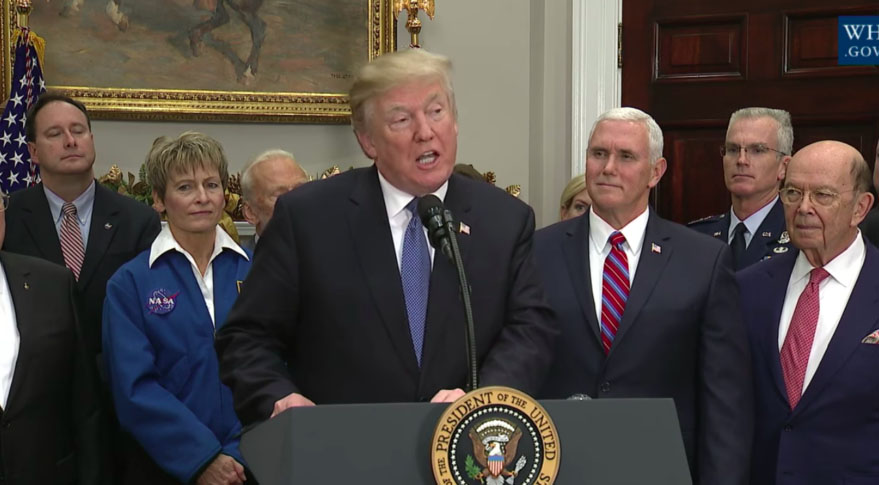Space Industry Takes Prominent Role in Trump's National Security Strategy

WASHINGTON — The Trump administration is elevating the role of the privately funded space industry in advancing the nation's interests as competitors like Russia and China seek to challenge the United States and its free rein in space.
In the 2017 National Security Strategy released Dec. 18, the president commits the U.S. government to partnering with private industry to explore space and defend U.S. assets there. The administration also promises to help defend private space systems from hostile attacks.
The strategy makes the promotion of space commerce a national security priority. In that vein, the administration intends to overhaul industry regulations to motivate companies to invest and innovate. "The United States will simplify and update regulations for commercial space activity to strengthen competitiveness," says the document. [From Ike to Trump: Presidential Visions for Space Exploration]
The U.S. government and the private sector will advance human exploration across the solar system to "bring back to Earth new knowledge and opportunities," says the strategy. The administration will pursue public-private partnerships and promote ventures beyond low Earth orbit.
Further, the government will team up with commercial firms to "improve the resiliency of our space architecture. … We will also consider extending national security protections to our private sector partners as needed."
"The United States must maintain our leadership and freedom of action in space," says the strategy.
Protecting U.S. access to space is an imperative because so much economic and national security activities depend on it. "Communications and financial networks, military and intelligence systems, weather monitoring, navigation, and more have components in the space domain," says the document. "As U.S. dependence on space has increased, other actors have gained access to space-based systems and information."
Get the Space.com Newsletter
Breaking space news, the latest updates on rocket launches, skywatching events and more!
The "democratization of space" means many governments and nonstate actors can launch satellites into space at relatively low cost. And they can exploit the technology in ways that could be detrimental to the United States, the strategy cautions. "The fusion of data from imagery, communications, and geolocation services allows motivated actors to access previously unavailable information."
U.S. rivals are perfecting technologies and tactics to hack U.S. space assets, and that will require new approaches to deal with space as a contested battlefield. "Any harmful interference with or an attack upon critical components of our space architecture that directly affects this vital U.S. interest will be met with a deliberate response at a time, place, manner, and domain of our choosing."
The strategy casts China and Russia as sly, stealthy rivals that quietly are working to undermine U.S. advantages. "They are patient and content to accrue strategic gains over time — making it harder for the United States and our allies to respond," says the strategy. "Such actions are calculated to achieve maximum effect without provoking a direct military response from the United States."
The United States "must prepare for this type of competition" in which space is just one piece of the puzzle. Adversaries assume the United States views the world in binary terms, with states being either "at peace" or "at war," when it is actually an arena of continuous competition. "Our diplomatic, intelligence, military, and economic agencies have not kept pace with the changes in the character of competition."
The responsibility to advance these policies will fall on the National Space Council, chaired by Vice President Mike Pence. The council will "review America's long-range space goals and develop a strategy that integrates all space sectors to support innovation and American leadership in space."
Scott Pace, executive secretary of the National Space Council, echoed the themes of the president's strategy last week in a speech to a space law group in Washington, D.C.
"The United States should strive to be the most attractive jurisdiction in the world for private sector investment and innovation in outer space," Pace said. "This requires a transparent, efficient, and minimally burdensome domestic regulatory mechanism for U.S. companies conducting space activities."
The U.S. government and the private sector, he said, "should use legal and diplomatic means to create a stable, peaceful environment not only for governmental activities, but also for commercial ones." This will require efforts to "minimize and mitigate harmful interference to our space systems, whether from terrestrial actors or from space actors."
The American private sector, Pace said, "must have confidence that it will be able to profit from capital investments" in space systems and infrastructure.
This story was provided by SpaceNews, dedicated to covering all aspects of the space industry.
Join our Space Forums to keep talking space on the latest missions, night sky and more! And if you have a news tip, correction or comment, let us know at: community@space.com.

Sandra Erwin covers the military and national security beat as a Senior Staff Writer at SpaceNews. Sandra, based in Arlington, Virginia, specializes in Defense Department and Intelligence Community space programs, policy, budgets, technology and the industry that supports this sector. She joined SpaceNews in October 2017. Before coming to SpaceNews, Erwin covered the U.S. military, the Pentagon, Congress and the defense industry for over two decades as editor of the National Defense Industrial Association's National Defense Magazine and Pentagon correspondent for Real Clear Defense.











